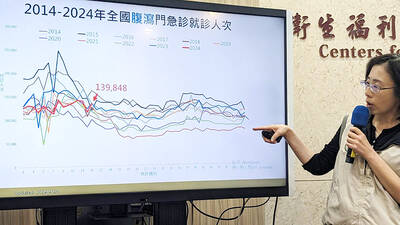Since the beginning of the flu season in July last year, 107 people in Taiwan have died from flu-related illnesses, Department of Health Minister Chiu Wen-ta (邱文達) told the legislature’s Social Welfare and Environmental Hygiene Committee yesterday.
Health officials said the number of people affected with seasonal influenza was expected to drop this month and next as temperatures climb.
Of those who died from the flu, more than 70 were infected with A(H1N1), commonly known as swine flu, the department said.

Photo: Chen Feng-li, Taipei Times
People above the age of 65 had the highest fatality rate from the flu, health officials said.
The department said people in the high-risk group, such as young children and the elderly, as well as people with chronic diseases, were more prone to develop complications and severe symptoms from the flu. People who fall into these categories are strongly advised to receive flu shots if they have not already done so.
“I recently surveyed hospitals in various parts of the country and found that numbers of emergency visits to the hospital [from flu-like symptoms] have dropped,” Chiu said.
However, the health minister said he would still instruct local health authorities to remain alert and avoid being complacent about flu conditions.
The department said a majority of those who died from flu had not been vaccinated against seasonal flu viruses, adding that receiving flu shots was the most effective measure against the disease.
The Centers for Disease Control said that according to the WHO, the next flu season is expected to be dominated by the A(H1N1) virus and other strains similar to those from this season.
Although people who have already been infected develop immunity within two to three weeks, they are nevertheless advised to rest and drink plenty of water to help rebuild their immune system.

FLU SEASON: Twenty-six severe cases were reported from Tuesday last week to Monday, including a seven-year-old girl diagnosed with influenza-associated encephalopathy Nearly 140,000 people sought medical assistance for diarrhea last week, the Centers for Disease Control (CDC) said on Tuesday. From April 7 to Saturday last week, 139,848 people sought medical help for diarrhea-related illness, a 15.7 percent increase from last week’s 120,868 reports, CDC Epidemic Intelligence Center Deputy Director Lee Chia-lin (李佳琳) said. The number of people who reported diarrhea-related illness last week was the fourth highest in the same time period over the past decade, Lee said. Over the past four weeks, 203 mass illness cases had been reported, nearly four times higher than the 54 cases documented in the same period

A group of Taiwanese-American and Tibetan-American students at Harvard University on Saturday disrupted Chinese Ambassador to the US Xie Feng’s (謝鋒) speech at the school, accusing him of being responsible for numerous human rights violations. Four students — two Taiwanese Americans and two from Tibet — held up banners inside a conference hall where Xie was delivering a speech at the opening ceremony of the Harvard Kennedy School China Conference 2024. In a video clip provided by the Coalition of Students Resisting the CCP (Chinese Communist Party), Taiwanese-American Cosette Wu (吳亭樺) and Tibetan-American Tsering Yangchen are seen holding banners that together read:

Heat advisories were in effect for nine administrative regions yesterday afternoon as warm southwesterly winds pushed temperatures above 38°C in parts of southern Taiwan, the Central Weather Administration (CWA) said. As of 3:30pm yesterday, Tainan’s Yujing District (玉井) had recorded the day’s highest temperature of 39.7°C, though the measurement will not be included in Taiwan’s official heat records since Yujing is an automatic rather than manually operated weather station, the CWA said. Highs recorded in other areas were 38.7°C in Kaohsiung’s Neimen District (內門), 38.2°C in Chiayi City and 38.1°C in Pingtung’s Sandimen Township (三地門), CWA data showed. The spell of scorching

UNAWARE: Many people sit for long hours every day and eat unhealthy foods, putting them at greater risk of developing one of the ‘three highs,’ an expert said More than 30 percent of adults aged 40 or older who underwent a government-funded health exam were unaware they had at least one of the “three highs” — high blood pressure, high blood lipids or high blood sugar, the Health Promotion Administration (HPA) said yesterday. Among adults aged 40 or older who said they did not have any of the “three highs” before taking the health exam, more than 30 percent were found to have at least one of them, Adult Preventive Health Examination Service data from 2022 showed. People with long-term medical conditions such as hypertension or diabetes usually do not